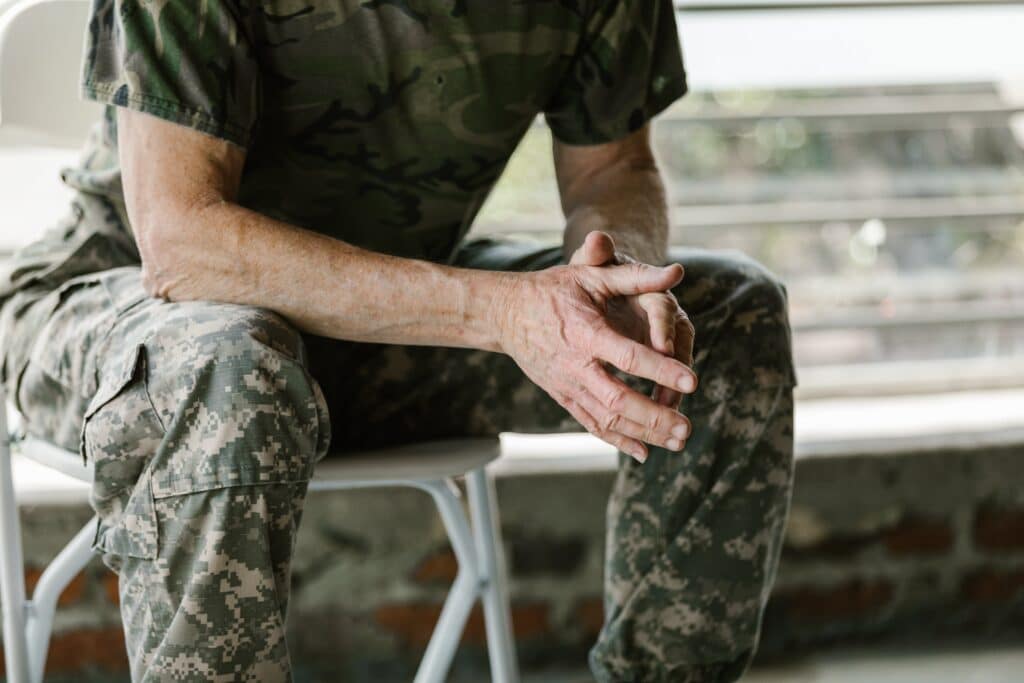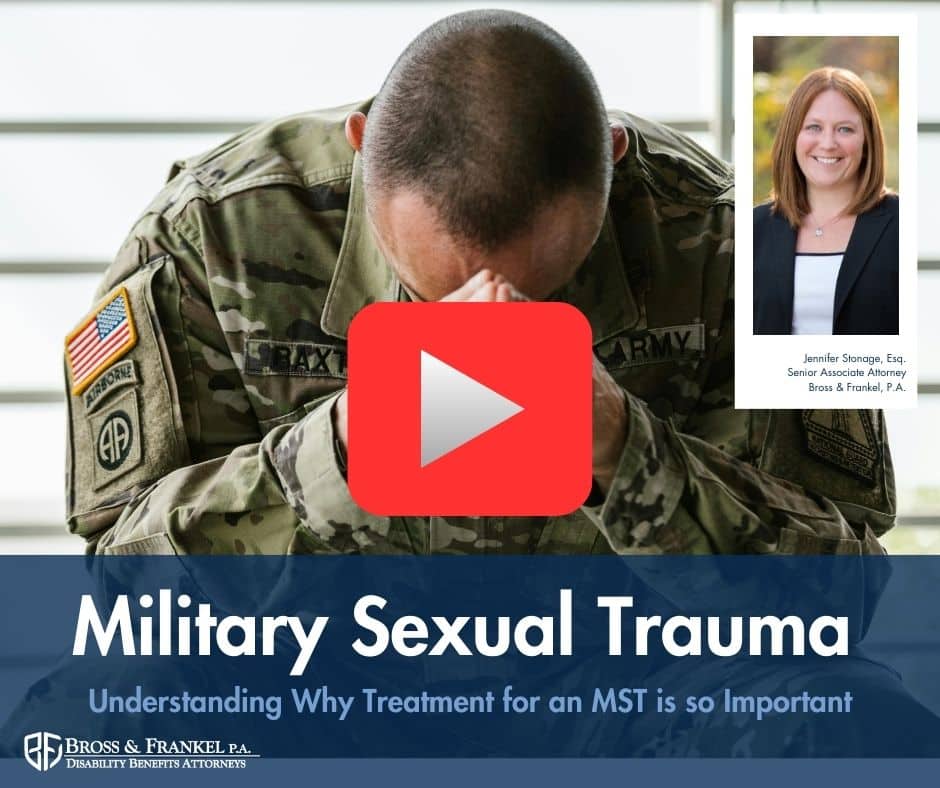
What is a Military Sexual Trauma?
The term “Military Sexual Trauma” or “MST” is a term used by The Department of Veterans Affairs (the VA) to refer to any sexual harassment or assault experienced by a military service member. It is a common misconception that MST only refers to sexual acts, however, it can include many different activities that can have a lasting physical, emotional, and psychological effect on an individual. This list of activities may include, but is not limited to, being pressured into sexual activities through force or threats of negative treatment, promises for better treatment in exchange for sex, sexual contact or activities without your consent, being touched or grabbed in a sexual way that makes you uncomfortable (including during “hazing”), and unwanted sexual advances. If it is non-consensual sexual activity, then it falls under the category of an MST. The inability to say “no” or otherwise reject the advances does not constitute consent to the activities.
Unfortunately, survivors are often hesitant to report an MST for many personal and professional reasons. National data indicates that only about 1 in 3 women and 1 in 50 men will report a military sexual trauma. It is completely understandable given the nature of the military, as well as personal and professional reasons. While it is understandable that survivors may hesitate to report MST immediately, it cannot be stated strongly enough that reporting the MST to your superiors and your medical providers is critical to ensuring that you receive the proper care you need for any physical or mental injuries you might sustain.
What Happens if You Decide Not to Report Your Military Sexual Trauma to the Military? Are You Still Eligible to Collect Veterans’ Disability Benefits in the Aftermath?
The short answer is yes. The VA recognizes the limited reporting of military sexual trauma events and understands the reality that no record of the assault may exist (such as police records, statements from friends, and medical testing). While that would be problematic in a criminal case, it is not as critical in a claim for veterans disability benefits through the VA.
What can be done to prove a military sexual trauma occurred, outside police reports or medical testing? Just like with any disability case, we can look outside the box. The VA has recognized that proof of changes in behavior and behavioral response, either while in the military or post-military may support a claim for MST.
The VA indicates that behavioral changes may include, but not be limited to:
- A sudden request for duty re-assignment, without justification
- Obsessive-compulsive behaviors (eating disorders, under-eating, or overeating for example)
- Increased disrespect for military authority or civilian authority
It is stated, that when a MST occurs but is not reported, “there must be evidence that would lead to reasonable conclusion that the incident occurred.” Such evidence includes military or civilian documentation, after the incident, which could reasonably be expected from a person who had undergone a personal assault.
Please Be Sure to Get the Treatment You Need
It is crucial to prioritize your health and well-being, especially in cases of military sexual trauma. If possible, make sure to document any physical and mental health issues resulting from the MST. Seek medical and mental health treatment from healthcare professionals experienced in dealing with MST cases, if available, and be sure to be honest with them about your condition and military service history.
Keep records of all appointments. Collect as much evidence as you can that will support your claim for veterans’ disability benefits. This may include medical records, mental health evaluations, statements from witnesses, or any other documentation that can substantiate the occurrence of the MST and its impact on your life.
For example, someone who has been legally married and divorced/annulled multiple times in the years after their MST may prove they are suffering from PTSD from the event that directly corresponds to their consistent relationship difficulties (distance, isolation, lack of communication, lack of intimacy, inability to socialize effectively, etc.) Similarly, if you previously had no issues with authority, but since your MST you have consistently had difficulties at work, including getting written up, altercations with co-workers/supervisors, or have had interactions with the law because of your own behavior (i.e. getting in fights and altercations with friends or strangers over something small and insignificant) you may be able to prove these changes in behavior were a direct result of the MST event.
The more medical records, documentation, and evidence that you can record and collect, the more information you will have to substantiate your claim that the MST in fact occurred without having reported the same while in the military.
Filing Your Claim with the VA
In order to pursue veterans’ disability benefits from an unreported military sexual trauma, you will still need to file a claim with the Department of Veterans Affairs. You can do this by completing and submitting the necessary forms, including VA Form 21-526EZ.
As part of the VA’s evaluation process, you may be required to attend a Compensation and Pension (C&P) examination. This examination will be your first opportunity to discuss the in service event that caused your disability. It is critical that you are transparent and honest about what happened, and advise the examiner that the incident was not reported, and additionally the reason you were unwilling to report it. The examiner will also assess the extent of your disabilities and their connection to the MST.
How Bross & Frankel, P.A. Can Help
The process of applying for and being approved for veterans disability benefits from the Department of Veterans Affairs can be frustrating. If you have experienced military sexual trauma during your time of military service, then you may be eligible for monthly disability benefits…regardless of whether the MST was reported. After you have filed an initial application for benefits, our law office can assist you with any appeals or related proceedings after you file an initial application for benefits.
Based in Cherry Hill, NJ, Bross & Frankel represents people with disabilities – including disabled veterans – in New Jersey, Delaware, Pennsylvania, and across the country. Veteran’s disability claims are governed by Federal Law, so we are able to represent clients from all over the country. For each of our veteran clients, our goal is to get you the highest possible disability rating so that you can get the compensation that you deserve for your service-connected medical or mental health condition. To learn more or to schedule a free claim review with a veterans disability attorney, contact our office today at (856) 795-8880 or fill out our online contact form.
Related: What Conditions Automatically Qualify for Disability?

Jennifer Stonage is a Senior Associate Attorney at Bross & Frankel, P.A. and primarily assists with the firm’s Veteran’s Benefits matters. She believes that the veterans who served our country are entitled to the help and compensation they are entitled to, and will put her knowledge to work to secure the highest possible compensation ratings. The VA process can be incredibly tricky to navigate. Let somebody who knows the system work to help you.
